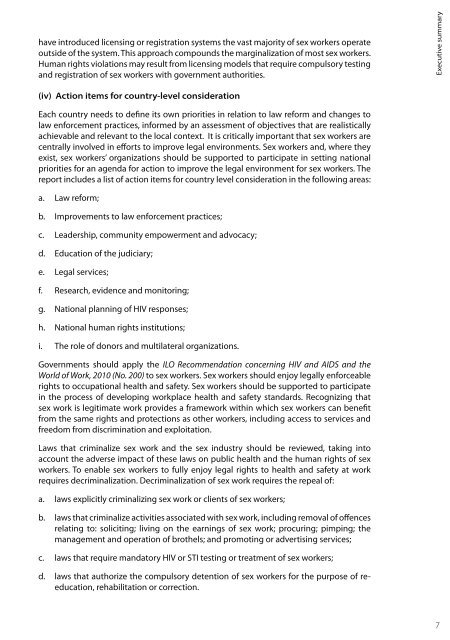SEX WORK AND THE LAW - HIV/AIDS Data Hub
SEX WORK AND THE LAW - HIV/AIDS Data Hub
SEX WORK AND THE LAW - HIV/AIDS Data Hub
You also want an ePaper? Increase the reach of your titles
YUMPU automatically turns print PDFs into web optimized ePapers that Google loves.
have introduced licensing or registration systems the vast majority of sex workers operate<br />
outside of the system. This approach compounds the marginalization of most sex workers.<br />
Human rights violations may result from licensing models that require compulsory testing<br />
and registration of sex workers with government authorities.<br />
Executive summary<br />
(iv) Action items for country-level consideration<br />
Each country needs to define its own priorities in relation to law reform and changes to<br />
law enforcement practices, informed by an assessment of objectives that are realistically<br />
achievable and relevant to the local context. It is critically important that sex workers are<br />
centrally involved in efforts to improve legal environments. Sex workers and, where they<br />
exist, sex workers’ organizations should be supported to participate in setting national<br />
priorities for an agenda for action to improve the legal environment for sex workers. The<br />
report includes a list of action items for country level consideration in the following areas:<br />
a. Law reform;<br />
b. Improvements to law enforcement practices;<br />
c. Leadership, community empowerment and advocacy;<br />
d. Education of the judiciary;<br />
e. Legal services;<br />
f. Research, evidence and monitoring;<br />
g. National planning of <strong>HIV</strong> responses;<br />
h. National human rights institutions;<br />
i. The role of donors and multilateral organizations.<br />
Governments should apply the ILO Recommendation concerning <strong>HIV</strong> and <strong>AIDS</strong> and the<br />
World of Work, 2010 (No. 200) to sex workers. Sex workers should enjoy legally enforceable<br />
rights to occupational health and safety. Sex workers should be supported to participate<br />
in the process of developing workplace health and safety standards. Recognizing that<br />
sex work is legitimate work provides a framework within which sex workers can benefit<br />
from the same rights and protections as other workers, including access to services and<br />
freedom from discrimination and exploitation.<br />
Laws that criminalize sex work and the sex industry should be reviewed, taking into<br />
account the adverse impact of these laws on public health and the human rights of sex<br />
workers. To enable sex workers to fully enjoy legal rights to health and safety at work<br />
requires decriminalization. Decriminalization of sex work requires the repeal of:<br />
a. laws explicitly criminalizing sex work or clients of sex workers;<br />
b. laws that criminalize activities associated with sex work, including removal of offences<br />
relating to: soliciting; living on the earnings of sex work; procuring; pimping; the<br />
management and operation of brothels; and promoting or advertising services;<br />
c. laws that require mandatory <strong>HIV</strong> or STI testing or treatment of sex workers;<br />
d. laws that authorize the compulsory detention of sex workers for the purpose of reeducation,<br />
rehabilitation or correction.<br />
7
















